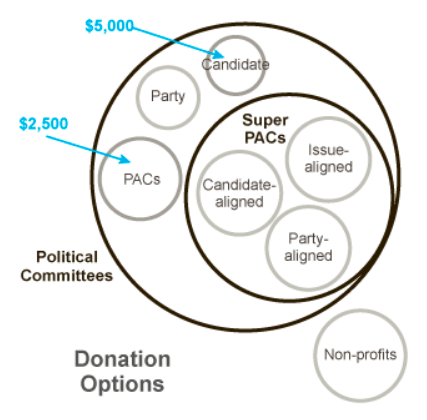Dear Group,
|
In Part I of Citizens United we covered the background, the personalities, and the Orwellian naming of the group Citizens United. Part II offered an anatomy of the decision, the political underpinning of the Supreme Court’s workings on the case. Today I want to emphasize the importance of the decision in Citizens United v. FEC and its followup. McCain-Feingold (2002) was the last gasp of bipartisan acknowledgement that the influence of extreme wealth in manipulating voters is a problem. It limited electioneering communication in the months preceding elections and capped the amount of money an individual was allowed to donate. John McCain (R-AZ), the Senate Republican whose name is attached to the law, is now one of only a handful of relatively principled, thoughtful Republican Congresspeople remaining…and he is battling brain cancer (and was recently dismissed as “dying” by a White House spokesperson). In the mid aughts (2000-2010), while polls consistently showed that most Americans regardless of party affiliation favored strict election spending limits, an extraordinarily rich minority led by the Koch brothers strategized legal cases that would roll back monetary limits all the way to the Tillman Act 1907 in the days of Theodore Roosevelt. The Kochs and friends counted on voters’ inattention. They invented and funded organizations with deceptive names like Citizens United and SpeechNow, waving the banner of “free speech” to deceive the gullible (of whom I was one at the time). For decades the mega-wealthy had worked to seat a Libertarian majority on the Supreme Court. With the appointment of John Roberts to the Supreme Court in 2003 and his elevation to Chief Justice in 2005 (both by George W. Bush), the goal was within reach. Roberts, Alito, Thomas, Scalia, and Kennedy, would further the cause of equating money with speech. Citizens United v FEC (January 21, 2010) proclaimed that anything goes as long as it is an “independent expenditure.” This ruling bypassed nearly all of the restrictions of election finance in the system we have worked with since the early 1970s. That system, the one Citizens United bypassed, is represented in the upper left crescent in the diagram below. It is the system governed under the Federal Elections Commission, the system on which I focused in Cathy’s Coffers !, II, and III. Citizens United furthered the development of a parallel system of mostly unregulated spending in the SuperPAC circle and simultaneously fueled election spending in the non-profit arena. The only requirement is that the spending be “independent,” a requirement that is both a joke and danger. A joke in that no one can really police such a requirement, and a danger in that “independent” money can wrest control of the message from the candidate, helping to put that control in the hands of those with the biggest monetary mouthpiece, the superPACs and certain non-profits. Significantly, Citizens United v. FEC lifted the restriction on corporate and union electioneering contributions (as long as they are “independent”) that had begun with Theodore Roosevelt in 1907. SpeechNow,org v. FEC. SpeechNow.org, another deceptively named astroturf organization, already had a case in line. On March 26, 2010, two months after Citizens United, the U.S. Court of Appeals for the District of Columbia Circuit used the Citizens United decision as the basis for a ruling on SpeechNow.org v. FEC. In SpeechNow the Court of Appeals struck down the federal limits on contributions to federal political committees that make only independent expenditures and do not contribute to candidates or political parties. On the other hand, the Court also ruled such independent expenditure committees (=superPACs) must report their donors to the FEC just like regular PACs (the ones in the crescent on the diagram below). “SpeechNow” sounds like another grassroots, citizen supported organization, doesn’t it? Wrong. You can visit its total of just five donors in the 2009-2010 election cycle here at the FEC. David Keating, one of the five, is also the treasurer for the organization…and the Executive Director of the Club For Growth. The Club For Growth is non-profit whose donors are part of the Dark Money world. The Club for Growth has a reputation of attacking Republican lawmakers “from the Right” to keep them in line (and pull the remaining principled Republican rightward). On April 2, 2014, in McCutcheon v. FEC, the same five Libertarian judges on the Supreme Court, Roberts, Scalia, Alito, Kennedy, and Thomas pushed the money floodgates wide open. In McCutcheon they ruled that aggregate political spending limits are unconstitutional. In the 2011-2012 election cycle the aggregate contribution ceiling on individuals during stood at $46,200 for federal candidates and $70,800 for national parties, or a $117,000 aggregate limit. That limit was established in 1974 and revised upward by McCain-Feingold in 2002. Mr. McCutcheon, an uber-wealthy Alabamian, apparently felt constrained by these limits. The Libertarian Supreme Court majority agreed, saying such limits were an unconstitutional infringement of free speech rights. As a result of McCutcheon In the current election cycle (2017-18) more than 19,000 political contributions of a milion dollars or greater have been made. That’s 19 billion dollars…with a b. Republican/Libertarian big money interests have hoodwinked sleepy, distracted voters with populist-sounding names and appeals to “free speech” and pushed the floodgates of campaign spending wide open. Keep to the high ground, Jerry
This diagram is from a 2014 interactive article in the NYTimes. It is a great place to start understanding the effect of money in our politics. The limits on contributions are indexed to inflation, so the illustrated limits are now higher, e.g. $5400 can be given directly to a Candidate’s election committee ($2700 for the Primary and $2700 for the General election), and a conventional political action committee (PAC) can receive $5000 from an individual donor. |
